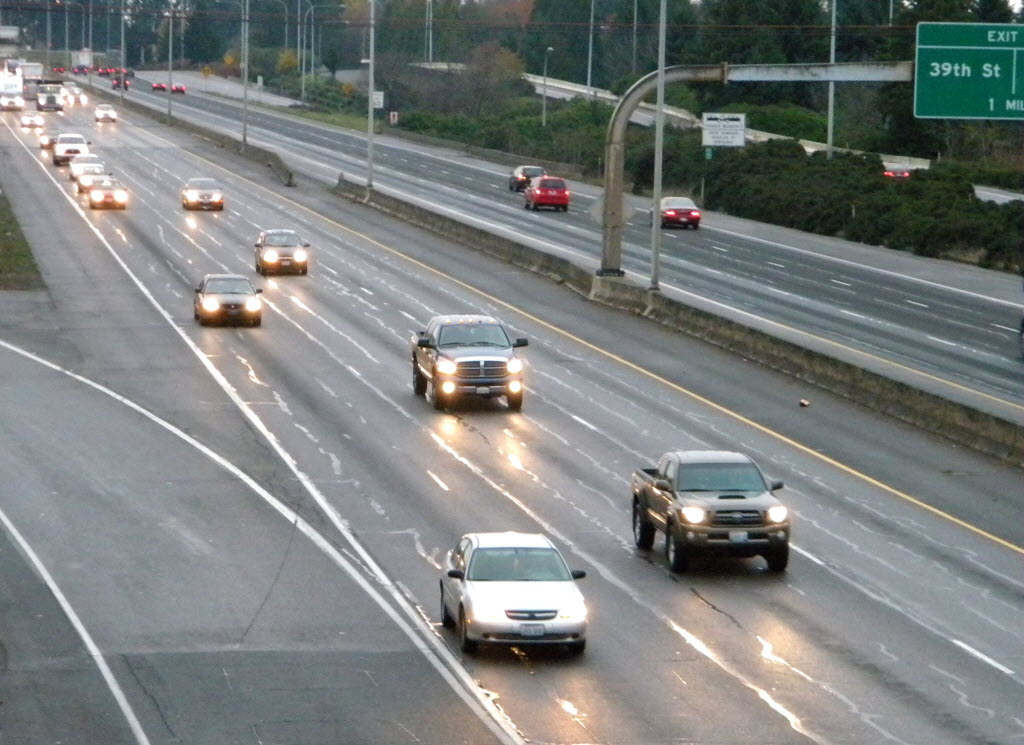SEATTLE — Facing steep declines in gas-tax revenues that pay for road repairs, Washington state is exploring a creative solution: charging drivers by the mile to use state highways and roads.
A committee of transportation experts recently concluded it’s feasible to move the state away from gasoline taxes to a “pay as you go” road fee system for transportation.
“Now we’re questioning: Is it acceptable for Washington and if so, in what form?” state Transportation Secretary Paula Hammond said.
More than a dozen states have studied the idea, but the concept is still new and so far no state has implemented it widely.
The gasoline tax has been the main source of money for highway maintenance and repair in Washington for decades. But revenues from the tax, which is levied as a fixed amount per gallon, have been declining as residents drive fewer miles and more fuel-efficient cars hit the road.
Further steep declines are expected when fuel-efficiency standards passed last year by the Obama administration take effect, requiring automakers to nearly double the average gas mileage of all new cars and trucks by 2025.
“The gas tax is dwindling,” Hammond said. “It would be irresponsible for us not to look ahead and take care of our system in the future.”
Between 2007 and 2023, fuel tax revenues are projected to fall by more than $5 billion, according to state estimates.
Last year, the Legislature charged a steering committee with studying whether a road user fee was possible, and recommending next steps. The Washington Transportation Commission is expected to finalize the committee’s report later this month and ask state lawmakers for about $1.6 million in the 2013-15 budget to study how the idea would work.
“We’re a long way yet from knowing whether it’s a good idea,” said Jeff Doyle, the state’s project director for the road user charge assessment.
Hammond said it could be 10 years before the state implements any sort of road user fee. “We’re taking it one step at a time,” she said, adding, “I think a robust policy debate is absolutely necessary, and a public vetting.”
Still to be debated is how the fee would be charged — by miles driven, time spent on the road or another alternative — and how mileage would be reported or collected.
Options for collecting mileage include annual odometer readings, smartphone apps and equipping cars with GPS devices that would track miles driven. But the prospect of tracking drivers by GPS is likely to raise protests from those concerned about privacy issues.
The idea of charging drivers by the mile isn’t a new one. At least 18 states have studied the idea as one of many ways to replace the fuel tax, but no state has implemented it widely, said Jaime Rall, a senior policy specialist with the National Conference of State Legislatures.
“It’s a very popular idea to think about, but there’s no jurisdiction that has that kind of fee on all vehicles. It’s still very much experimental,” Rall said. “It’s one of the options on the table. Many transportation experts think it’s one of the better options, but the general public still has very real concerns about privacy and equity.”
An Oregon pilot project is testing a way to collect road user fees.
Martin Callery of North Bend, Ore., is one of 40 volunteers who have agreed to pay a charge for each mile they drive during the three-month project.
He equipped his 2009 Honda CRV with a GPS device that tracks his miles. Other volunteers had the choice to pay a flat-rate plan that doesn’t report mileage or to report mileage without a GPS.
Based on early reports, Callery thinks he and his wife have paid less than what they would have paid in fuel taxes.
“I think this is an important phase of getting a system that’s ready to go,” said Callery, who works for the Port of Coos Bay.
Privacy may be a concern for some who don’t want government tracking their movements, but Callery said it wasn’t a big deal for him.
Callery said he thinks all roadway users need to pay their fair share. “If people want to see the transportation system maintained and improved, they’re going to pay as you go,” he said.




